Our growers from Meath, Cork and Derry have all finished their autumn sowing campaign. Conditions this sowing season have been near ideal and the focus now shifts to autumn weed control and aphicide applications.
Clonee, Co Meath
Fieldwork could be carried out where you wanted, when you wanted over the past month in Clonee as ground conditions have been ideal. Ditches along field boundaries remain empty, explains Martin, as any rain which did fall over the past month just served to wet the surface. Growing conditions had been good up until the weekend, when things turned notably cooler.
His winter oilseed rape is around 12-15cm in height and is continuing to develop well. There were a number of wheat volunteers present in the crop, however, so 10 days ago Martin applied Claw at 0.7l/ha. This should take care of any wild oats present in the crop as well, explains Martin.
In the same tank, he also applied the foliar feed Naturmin WSP Amino Acid (0.5l/ha) and a boron trace element spray, LiquiBor (2.0l/ha). The ground where the oilseed is sown is slightly deficient in boron, says Martin. He also added Proline (0.66l/ha) as a preventative for light leaf spot.
Low slug activity
Martin has a number of bait traps down but can’t find any slugs this year. He uses a sheet of cardboard with a number of slug pellets underneath as a trap. Beetle numbers appear to be very high, however, and Martin wonders if they are responsible for eating the slug eggs and keeping populations down. Charlock control from previous Cleranda applications has worked very well, he remarks.
His Bennington and Costello winter wheat have all emerged and are developing well. The crop is at the two- to three-leaf stage and establishment was around 90%. Earlier this month, the crop received a pre-emergence spray of Stomp Aqua (01.5l/ha) and Vigon (0.75l/ha) for grassweed control.
The crop may get another spray in the spring for broadleaved weed control. Using his Atlas Airtec sprayer, he uses a water rate of 80l/ha. Last week he applied an autumn aphicide of Karis (0.05l/ha). We visited Martin last week as he was spraying the aphicide.
“We’ve put in a few drains over the past month; it’s really about maintenance now. The combine is serviced and in the shed and we’ll soon make the sprayer winter ready”

Mogeely, Co Cork

Stephen Collins started lifting beet this week with his two row Armer Salmon TR2000 harvester.
Conditions have been ideal for autumn sowing in east Cork over the past month. Rainfall for October in Mogeely was about 85mm less than the same month last year.
There have been some ground frosts and the weather has turned notably cooler since the weekend, however. Growth has returned to more normal levels over the last week, says Stephen.
The good weather has extended the grazing season in the area, which means Stephen’s cattle remained outdoors during sowing, which freed up a bit more time each day. With stronger than anticipated grass growth, he has delayed pulling the first of his beet until this week. The crop continues to bulk and Stephen is hopeful it will yield.
Like many crops this year, his winter oilseed rape is looking well. A good canopy has now developed and Stephen will apply Proline (0.4l/ha) within the next week for light leaf spot and phoma control. The crop may also receive a graminicide for grassweed control on the headlands. Stephen will also add Bortrac (3.0l/ha) into the tank. The earlier application of Salsa (25g/ha) gave a good level of charlock control. Slug populations remain very low and Stephen will not have to apply slug pellets.
Winter barley sowing began on 2 October and finished eight days later. His Kosmos and Infinity barley was sown to establish 300 plants/m2. His Belfry hybrid barley was sown to establish 200 plants/m2. Some of the barley received a pre-emergence spray of Defy (2.0l/ha) and Hurricane (0.1l/ha). A post-emergence spray of Firebird (0.3l/ha) and Hurricane (0.1l/ha) was applied to the remaining crops.
Winter wheat sowing started on 18 October and finished five days later. His winter wheat was sown to establish 270 plants/m2. If he lifts the first of his beet in good conditions he may consider sowing winter wheat in that ground.
However, crows have become very active and are highly likely to be an issue in any later planted wheat. Winter oats were sown last week, aiming to establish 375 plants per m2. All crops were rolled after.
“You would nearly have needed wellingtons sowing last autumn; this year you could have worn your slippers.”

Limavady, Co Derry
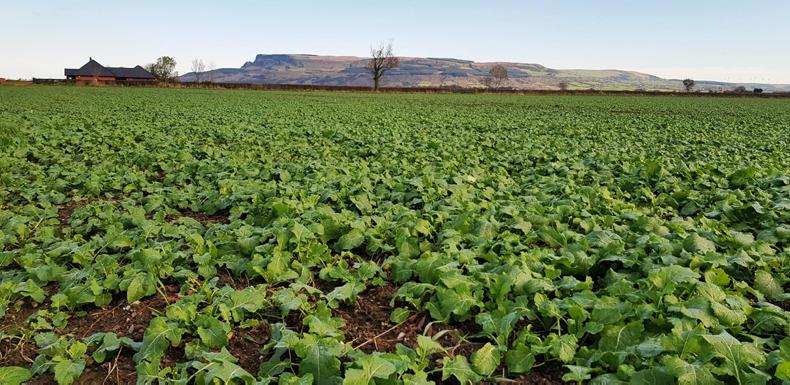
Richard Kane's recieved an application of Kerb (1.8l/ha) for grassweed control this week.
Rolling after autumn sowing is a rarity in the northwest but was done with ease this year. While there hasn’t been much sunshine, ground conditions remain excellent and Richard has now caught up with sowing.
The last of the straw was baled at the start of October. Some straw had to be turned four times as continual light showers made for difficult drying conditions. His spring oilseed rape averaged eight 4x4 round bales/ac whereas the last of the cereal straw managed five bales/ac.
Richard is very happy with his winter oilseed rape (WOSR), with what seems like near full emergence. The crop will receive an application of Kerb (1.8l/ha) this week for grassweed control. “It’s a long time since we’ve had a WOSR crop looking so well,” he says.
There is a high number of swans grazing in the area which may yet cause damage to the crop. Under previous environmental schemes, Richard received compensation for losses incurred by allowing birds to graze his crops during winter. However, under the new EFS, there is no provision for this measure. As chair of the Ulster Arable Society, he, along with the representatives of the Ulster Farming Union, met with environmental NGOs to discuss future schemes which could be developed in the country ones currently in place are not working, Richard explains.
There was success for Leona Kane, Richards’s wife and owner of Broighter Gold, at the 2018 British Farming Awards. The business took home silver in the Diversification Innovator of the Year (small to medium) awards, and was the only farm business to represent Northern Ireland. All of Richard’s oilseed rape is grown to supply the business.
Autumn sowing started on October 3, and six days later he had over 380 acres sown. Eighty per cent of the crops were min-tilled this year due to good ground conditions. He sowed Graham winter wheat for seed at 200kg/ha aiming for 90% establishment. He sowed his Infinity and Orwell winter barley at 180kg/ha, some of which will be going for seed. Herbicide applications will commence this week and he plans to apply Liberator (0.4l/ha).
“There was a mad rush on planting but the ground was in great shape and we flew through it.”
Read more
Watch: still good potential in 2018 beet crop
Watch: from the tramlines - crows proving problematic across the country
Our growers from Meath, Cork and Derry have all finished their autumn sowing campaign. Conditions this sowing season have been near ideal and the focus now shifts to autumn weed control and aphicide applications.
Clonee, Co Meath
Fieldwork could be carried out where you wanted, when you wanted over the past month in Clonee as ground conditions have been ideal. Ditches along field boundaries remain empty, explains Martin, as any rain which did fall over the past month just served to wet the surface. Growing conditions had been good up until the weekend, when things turned notably cooler.
His winter oilseed rape is around 12-15cm in height and is continuing to develop well. There were a number of wheat volunteers present in the crop, however, so 10 days ago Martin applied Claw at 0.7l/ha. This should take care of any wild oats present in the crop as well, explains Martin.
In the same tank, he also applied the foliar feed Naturmin WSP Amino Acid (0.5l/ha) and a boron trace element spray, LiquiBor (2.0l/ha). The ground where the oilseed is sown is slightly deficient in boron, says Martin. He also added Proline (0.66l/ha) as a preventative for light leaf spot.
Low slug activity
Martin has a number of bait traps down but can’t find any slugs this year. He uses a sheet of cardboard with a number of slug pellets underneath as a trap. Beetle numbers appear to be very high, however, and Martin wonders if they are responsible for eating the slug eggs and keeping populations down. Charlock control from previous Cleranda applications has worked very well, he remarks.
His Bennington and Costello winter wheat have all emerged and are developing well. The crop is at the two- to three-leaf stage and establishment was around 90%. Earlier this month, the crop received a pre-emergence spray of Stomp Aqua (01.5l/ha) and Vigon (0.75l/ha) for grassweed control.
The crop may get another spray in the spring for broadleaved weed control. Using his Atlas Airtec sprayer, he uses a water rate of 80l/ha. Last week he applied an autumn aphicide of Karis (0.05l/ha). We visited Martin last week as he was spraying the aphicide.
“We’ve put in a few drains over the past month; it’s really about maintenance now. The combine is serviced and in the shed and we’ll soon make the sprayer winter ready”

Mogeely, Co Cork

Stephen Collins started lifting beet this week with his two row Armer Salmon TR2000 harvester.
Conditions have been ideal for autumn sowing in east Cork over the past month. Rainfall for October in Mogeely was about 85mm less than the same month last year.
There have been some ground frosts and the weather has turned notably cooler since the weekend, however. Growth has returned to more normal levels over the last week, says Stephen.
The good weather has extended the grazing season in the area, which means Stephen’s cattle remained outdoors during sowing, which freed up a bit more time each day. With stronger than anticipated grass growth, he has delayed pulling the first of his beet until this week. The crop continues to bulk and Stephen is hopeful it will yield.
Like many crops this year, his winter oilseed rape is looking well. A good canopy has now developed and Stephen will apply Proline (0.4l/ha) within the next week for light leaf spot and phoma control. The crop may also receive a graminicide for grassweed control on the headlands. Stephen will also add Bortrac (3.0l/ha) into the tank. The earlier application of Salsa (25g/ha) gave a good level of charlock control. Slug populations remain very low and Stephen will not have to apply slug pellets.
Winter barley sowing began on 2 October and finished eight days later. His Kosmos and Infinity barley was sown to establish 300 plants/m2. His Belfry hybrid barley was sown to establish 200 plants/m2. Some of the barley received a pre-emergence spray of Defy (2.0l/ha) and Hurricane (0.1l/ha). A post-emergence spray of Firebird (0.3l/ha) and Hurricane (0.1l/ha) was applied to the remaining crops.
Winter wheat sowing started on 18 October and finished five days later. His winter wheat was sown to establish 270 plants/m2. If he lifts the first of his beet in good conditions he may consider sowing winter wheat in that ground.
However, crows have become very active and are highly likely to be an issue in any later planted wheat. Winter oats were sown last week, aiming to establish 375 plants per m2. All crops were rolled after.
“You would nearly have needed wellingtons sowing last autumn; this year you could have worn your slippers.”

Limavady, Co Derry

Richard Kane's recieved an application of Kerb (1.8l/ha) for grassweed control this week.
Rolling after autumn sowing is a rarity in the northwest but was done with ease this year. While there hasn’t been much sunshine, ground conditions remain excellent and Richard has now caught up with sowing.
The last of the straw was baled at the start of October. Some straw had to be turned four times as continual light showers made for difficult drying conditions. His spring oilseed rape averaged eight 4x4 round bales/ac whereas the last of the cereal straw managed five bales/ac.
Richard is very happy with his winter oilseed rape (WOSR), with what seems like near full emergence. The crop will receive an application of Kerb (1.8l/ha) this week for grassweed control. “It’s a long time since we’ve had a WOSR crop looking so well,” he says.
There is a high number of swans grazing in the area which may yet cause damage to the crop. Under previous environmental schemes, Richard received compensation for losses incurred by allowing birds to graze his crops during winter. However, under the new EFS, there is no provision for this measure. As chair of the Ulster Arable Society, he, along with the representatives of the Ulster Farming Union, met with environmental NGOs to discuss future schemes which could be developed in the country ones currently in place are not working, Richard explains.
There was success for Leona Kane, Richards’s wife and owner of Broighter Gold, at the 2018 British Farming Awards. The business took home silver in the Diversification Innovator of the Year (small to medium) awards, and was the only farm business to represent Northern Ireland. All of Richard’s oilseed rape is grown to supply the business.
Autumn sowing started on October 3, and six days later he had over 380 acres sown. Eighty per cent of the crops were min-tilled this year due to good ground conditions. He sowed Graham winter wheat for seed at 200kg/ha aiming for 90% establishment. He sowed his Infinity and Orwell winter barley at 180kg/ha, some of which will be going for seed. Herbicide applications will commence this week and he plans to apply Liberator (0.4l/ha).
“There was a mad rush on planting but the ground was in great shape and we flew through it.”
Read more
Watch: still good potential in 2018 beet crop
Watch: from the tramlines - crows proving problematic across the country








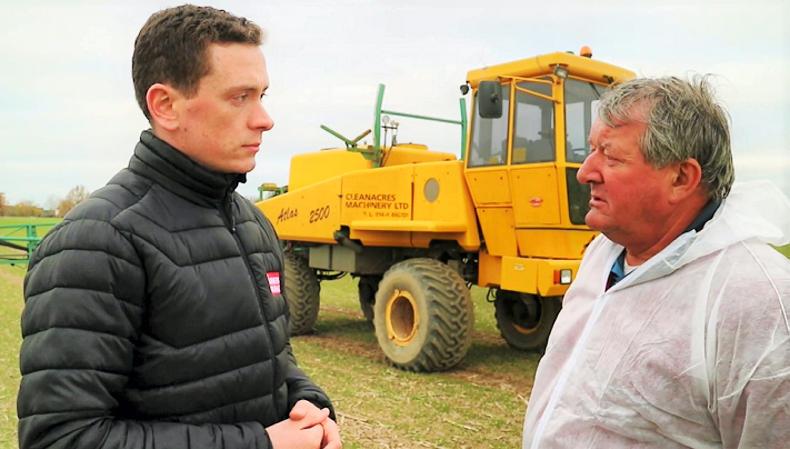
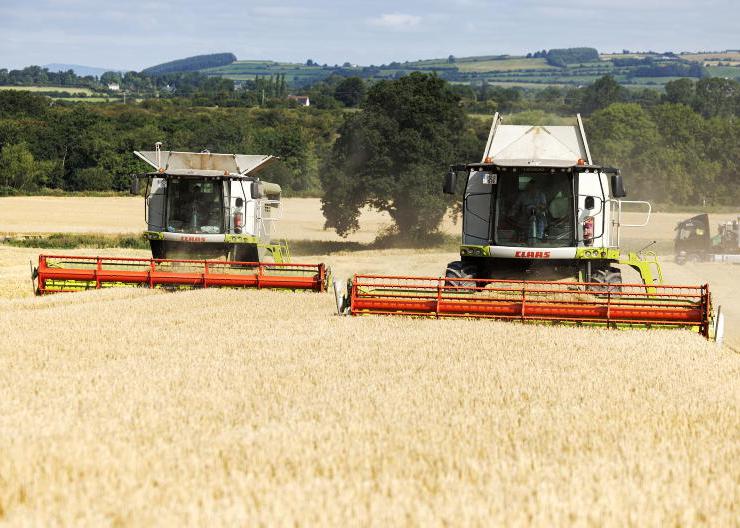

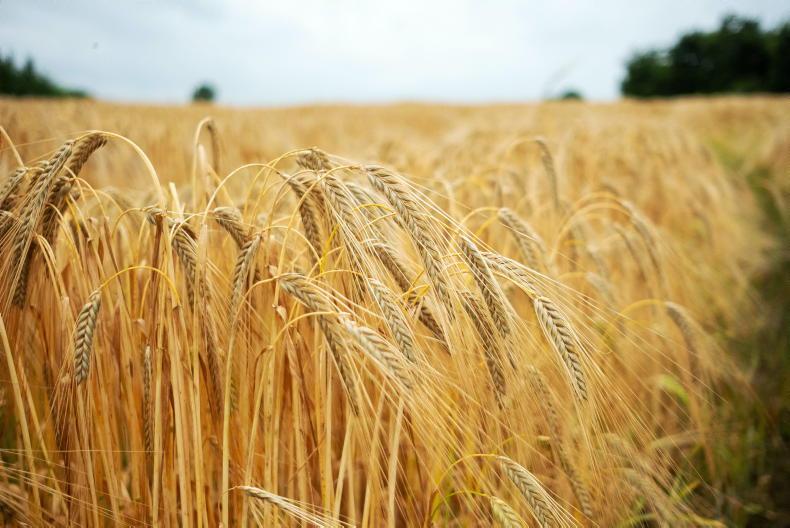
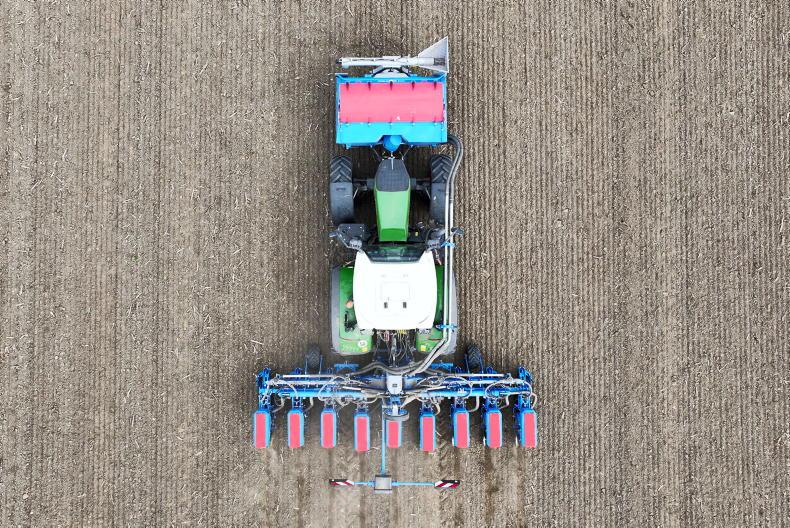
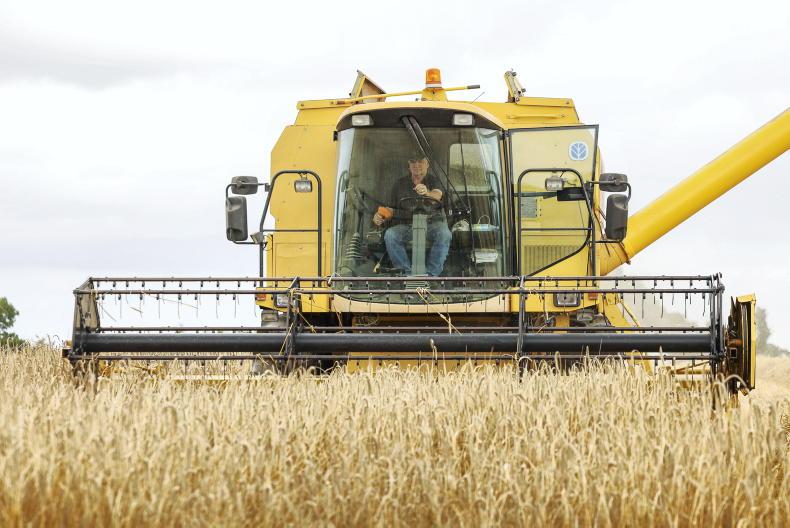
SHARING OPTIONS